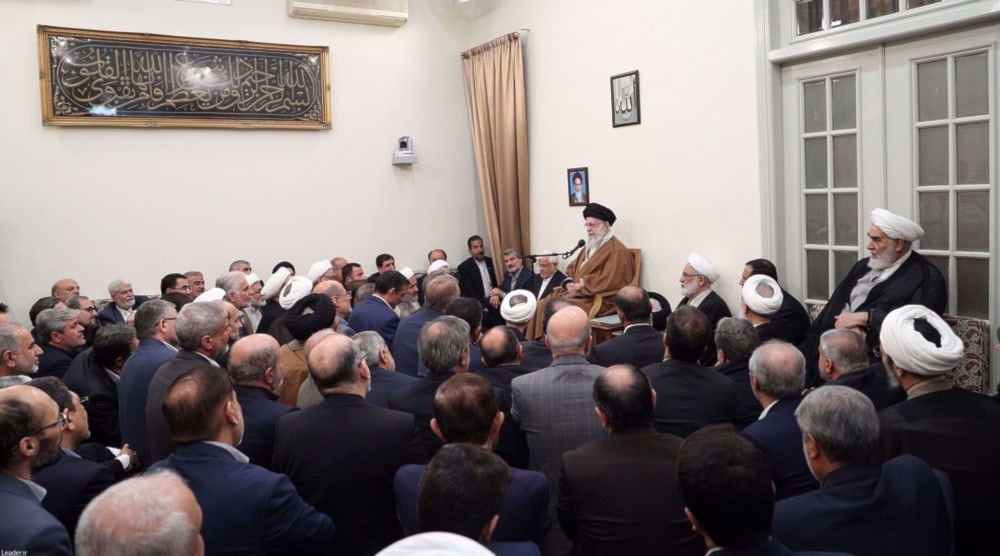Indirect US talks good, lack of trust remains: Sayyed Khamenei
The Leader of Iran, Sayyed Ali Khamenei, emphasized his country's position on the indirect talks between Tehran and Washington, noting that Iran remains confident in its abilities despite its skepticism regarding the discussions.
-

Sayyed Ali Khamenei addresses senior officials from the Islamic Republic’s executive, judicial, and legislative branches, on April 15, 2025. (Leader.ir)
Indirect negotiations between Iran and the United States in Oman have been carried out effectively in their early stages, though the Islamic Republic remains skeptical toward the other side, Iran's leader Sayyed Ali Khamenei said.
Sayyed Khamenei said on Tuesday, “We are neither excessively optimistic nor overtly pessimistic about these talks,” and stressed, “Of course, we are very distrustful about the other side," speaking to the leaders of the Islamic Republic’s executive, judicial, and legislative branches.
The Leader of Iran pointed out that the talks were among the various matters handled by the Foreign Ministry, emphasizing that it was an action and a measure that had been both decided upon and implemented.
Sayyed Khamenei stressed that progress in the Islamic Republic's diverse affairs should not be tied to the negotiations, insisting that the nation must advance its various matters autonomously while depending on its capabilities.
“Let us not tie the country’s issues to the talks,” he stated, emphasizing that despite Iran's immense skepticism regarding talks, he noted that Tehran is optimistic about its own capabilities.
These comments followed discussions between Iran and the US in Muscat last Saturday, where Oman's foreign minister acted as the intermediary.
Tehran: Iran-US Negotiations Focus on Nuclear Deal and Lifting Sanctions
Following the initial round of US-Iran talks on April 14, the Iranian Foreign Ministry's spokesperson clarified on Monday that the discussions were exclusively focused on the nuclear issue and the removal of unjust sanctions against Iran.
"There are contradictory positions expressed by several American officials, and they must resolve this inconsistency themselves," he stated, emphasizing that "Our primary demand is the lifting of unjust sanctions," during his weekly press conference.
Baghaei responded to the contradictory statements from US officials regarding the indirect negotiations, stressing, "You cannot claim to negotiate while simultaneously applying pressure and threats—this is unacceptable."
Indirect Iran-US talks
Indirect negotiations kicked off in the Omani capital, Muscat, on Saturday evening.
According to the Iranian Foreign Ministry, the talks were held at a location designated by the Omani government, with Iranian and American representatives situated in separate rooms.
An Omani source told Reuters that the talks are focused on de-escalating regional tensions, prisoner exchanges, and limited agreements to ease sanctions in exchange for controlling Iran's nuclear program.
During the opening session, Araghchi handed Oman's foreign minister Iran's official positions and reiterated Tehran's intention to reach a "fair and honorable agreement from an equal standing."
He noted that if Washington shared the same intent, the current dialogue could pave the way for a serious negotiation process. However, he stressed that the talks are, from Iran's perspective, limited solely to the nuclear issue.
While no breakthroughs were announced, both sides agreed to resume talks next week, signaling a shared commitment to keeping diplomatic channels open. The discussions represent the highest-level engagement between Tehran and Washington since the 2018 collapse of the 2015 nuclear deal following the Trump administration’s withdrawal.

 3 Min Read
3 Min Read









